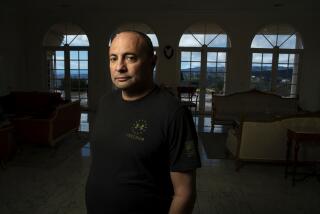Soviet Officials Accused of Capitalizing on Bargain Country Homes : Scandal: Former Prime Minister Ryzhkov is among those named. The legislature is investigating.
- Share via
MOSCOW — In one of the juiciest scandals to touch President Mikhail S. Gorbachev’s administration, the Soviet press and a legislative watchdog commission are accusing top officials of using their pull to buy government-owned dachas and their lavish furnishings at bargain-basement prices.
Among the officials accused of finagling a lovely house in the country for themselves are former Prime Minister Nikolai I. Ryzhkov, presidential military adviser Marshal Sergei F. Akhromeyev and Alexandra Biryukova, a former deputy prime minister and member of the Communist Party Politburo.
The Supreme Soviet, the national legislature, shook its collective head over the growing scandal on Friday, launched an investigation and passed a resolution banning further under-the-table sales of state property.
The legislature’s chairman, Anatoly I. Lukyanov, also said that Gorbachev has given Prime Minister Valentin S. Pavlov until July 25 to look into the sales of dachas, as country houses are known, and punish guilty officials.
“The system, based on irresponsible disposal of state property and violating the principles of social justice, clearly goes against democratic reforms and undermines the authority of the state,” the Supreme Soviet’s resolution said.
The dacha scandal also does much to undermine popular belief in free-market reforms by encouraging suspicions that when the time comes to sell state property to private buyers, only the well-connected will really have the chance to buy.
A law laying the basis for privatization was finally passed July 1, but the Soviet press had already dubbed the behind-the-scenes machinations to grab the posh dachas over the past year “creeping privatization.”
“While the workers were scrambling for the remains of cheese and sausage on the store shelves, the premier’s circle threw themselves after state property,” the government newspaper Izvestia complained.
The scam that Ryzhkov--who has repeatedly denied all allegations of wrongdoing--and dozens of other prominent officials are accused of running is a relatively simple one.
According to reports in two newspapers, Izvestia and Rabochaya Tribuna, Ryzhkov and members of the Cabinet of Ministers granted permission for state-owned dachas to be sold off to the high-placed state employees who occupied them and then approved extremely low assessments of their worth.
In more complex variations, high officials founded semiprivate businesses, known as cooperatives, and then sold themselves the dachas through them.
Other accusations focus on Ryzhkov’s decree allowing the sale of dacha contents, including furniture, appliances, silverware and linens, to the officials who had long occupied the buildings at near giveaway prices.
In some cases, officials reportedly bought dachas for a mere 3,000 rubles--about $100 at current open-market exchange rates.
The dacha scandal appears to be turning into a test case both for the Gorbachev government’s ability to police itself and for the true power of glasnost, or political openness.
“Yesterday’s leaders, having scented the captivating smell of property, have grabbed land allotments, dachas, refrigerators and the whole deal with a death grip,” Izvestia commented. “Can the public overpower it? Will the Parliament have the will to stop the illegal carting away of state property?”
The Congress of People’s Deputies, the country’s Parliament, established the special Commission on Privileges in 1989 to stop the lavish distribution, at taxpayers’ expense, of those goods that are in short supply; since then, the commission has published reams of its findings.
As portrayed in the commission’s reports, the officials who called themselves “the servants of the people” in fact lived in an elite world of special medical care, food supplies, cars and other privileges.
Gorbachev’s reforms had already unleashed a wave of popular rage against official privileges, and he cut many of them back.
Still, the Commission on Privileges found itself frequently stymied by a wall of resistance from the government, including the Council of Ministers, as it has tried to disclose other cases of the abuse of authority, along with the dubious dacha sales.
Some--like the military officials who use transport planes to take private vacations--would sound highly familiar to Americans who have followed the saga of White House Chief of Staff John H. Sununu’s use of official aircraft.
For a Soviet urbanite to own a dacha is far more usual than for an American to own a country house, and most dachas are modest affairs, small huts on tiny plots reachable only along barely passable roads.
But the dachas of high state officials tend to be posh estates, often two-story houses with saunas and extensive grounds.
It particularly upset Soviet taxpayers to read that Defense Minister Dmitri T. Yazov had a lavish dacha built in a neighborhood that lacked funds for a school or housing for doctors.
More to Read
Sign up for Essential California
The most important California stories and recommendations in your inbox every morning.
You may occasionally receive promotional content from the Los Angeles Times.










